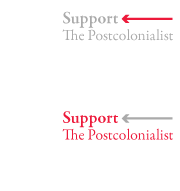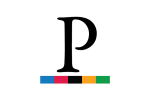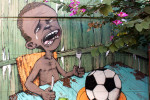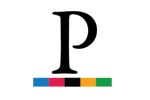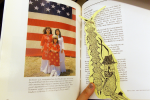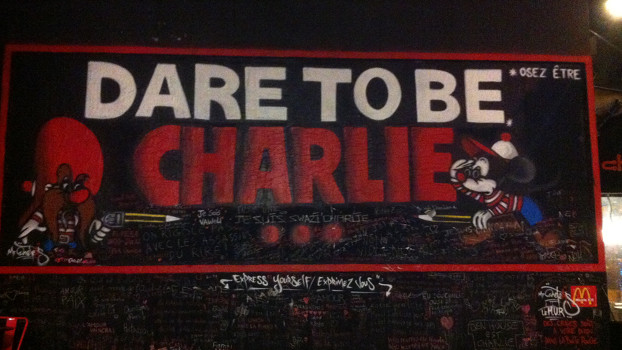
What postcolonial response can be made of the terrorist attacks on French satirical newspaper Charlie Hebdo, which led to the brutal massacre of most its editorial board? On January 7, two gunmen entered Charlie Hebdo’s offices in the 11th district of Paris, killing – amongst others – leading cartoonists Charb, Cabu, Honoré, Tignous and Wolinski. The gunmen are believed to have shouted “Allahu Akbar” (God is great in Arabic) and also “the Prophet is avenged”, in reference to a series of caricatures of Prophet Muhammad. The gunmen were later identified as the Kouachi brothers, two Muslim French citizens of Algerian descent who received weapon training in Yemen, as part of the Islamist terrorist organization Al Qaeda in the Arabian Peninsula (AQAP). Evidence also indicates that Amedy Coulibaly, who two days later killed four hostages at a Jewish kosher grocery in Porte-de-Vincennes in the 12th district, was connected to the Kouachi brothers. In a short video posted posthumously, Coulibaly claims to have belonged to another armed group, the Islamic State in Iraq and the Levant (ISIL).
All in all, the Charlie Hebdo shootings killed twelve, including three police officers. The three terrorists were hunted and ultimately gunned down by a police raid following a double hostage crisis, taking place simultaneously in two different Paris locations. The media’s sensationalist coverage of the event contributed to relaying and intensifying the post-traumatic shock that many French people felt in the aftermath. On January 11, about 2 million people, including more than 40 world leaders, marched in the streets of Paris to show solidarity with the dead cartoonists and support freedom of speech and of the press. The irony of political leaders being present at the march from countries like Egypt, Turkey or Israel, with dubious records with regards to freedom of speech and freedom tout court, was not lost on many people. The slogan, “Je suis Charlie” (I am Charlie) became the rallying cry of an otherwise largely silent crowd, still mourning and still struck by the significance of what had happened. People felt that something of the French spirit of irreverence had died in the attacks. Whether or not we liked Charlie Hebdo, the newspaper was the symbol of an epoch that seems by now definitely gone.
Charlie Hebdo first appeared in 1970 in the wake of May 1968, and as a successor to the Hara-Kiri magazine, banned for mocking the death of former French President Charles de Gaulle. The newspaper’s left-leaning, anti-clerical and anti-militarist stance led its cartoonists to lampoon all forms of authority, both secular and non-secular, such as patriarchy. Its sexually explicit content, crude language and caricature of the “beauf” (French equivalent of the redneck) served to break many taboos in a still largely rural, superstitious and bigoted country. Charlie Hebdo’s impertinence espoused to perfection one of the revolutionary slogans of May 68: “Il est interdit d’interdire” (it is forbidden to forbid). After ceasing publication in the 1980s, the newspaper resumed its weekly edition. Since then, Charlie Hebdo has been involved in over 50 legal trials, most of them stemming from complaints from the far right, mainstream media, and the Catholic Church. In most cases, it won. Since 2006 and the controversy over the caricatures of Prophet Muhammad, Charlie Hebdo has routinely denied being an Islamophobic, racist newspaper. The firing of leading cartoonist Siné in 2008 over allegations of anti-Semitism, the arson against the newspaper’s offices in 2011, and the terrorist attacks earlier this month however show that while Charlie Hebdo may have remained true to its libertarian credo, French society, on the other hand, had changed – not necessarily for the better.
Being French, I find myself deeply conflicted when it comes to defending Charlie. France does not forbid blasphemy and there exists a long and proud secular tradition of both religious and political satire, dating at least as far back as the French Revolution. This is not to deny the specifically postcolonial context in which arose the Charlie controversy, which pushed me to put my thoughts down on paper in what will hopefully trigger further debate on the Left. The story begins in the 1950s with anticolonial liberation struggles, particularly in Algeria. The current 5th French Republic was born as a result of the Algerian war of independence, which caused the collapse of the 4th Republic. These struggles were largely secular, inspired by pan-Arabic nationalism, third worldism, or communism. With the failure of these secular ideologies to prove inspiring alternatives to capitalism, religious ideology – “the opium of the people”, to use a consecrated Marxist formula – came to fill a political vacuum in an epoch described as “postrevolutionary” by some (Dirlik 1997). As one French journalist added in The Guardian after the attacks, “the chaos that emerged during and after independence wars (for which the west clearly has responsibility) provided an excellent opportunity for fanatics who had deeply resented the evolution of their countries, to return to prominence with a vengeance.”
Arab-Muslims who migrated to France from the 1960s onwards came for different reasons: to flee religious fundamentalism, to flee poverty, or because they saw France as the country of liberté, égalité, fraternité. This is, though, where I believe another story begins. Second and third generation Arab-Muslims were born in France yet grew up in a context of mass unemployment, racial discrimination and the rise of ethnico-religious communalism. The 2005 French Riots were a symptom of the rapid ghettoization of the now largely racialized banlieues (concomitant with the rise of the far right), and which a film like La Haine (Hatred) had predicted ten years earlier. In many ways, the Riots were a turning point: considered to be the biggest upheaval since May 1968, it also led the French government to re-institute Martial Law. Tellingly, the last time this had happened was during the Algerian War. The birth in 2006 of the decolonial political party Les Indigènes de la République, comprised of public intellectuals, academics and community activists from a variety of backgrounds, came to fill a much-needed space on the Left. Their diagnosis has been that the French Left – to which Charlie belongs – remains complicit with the perpetration of an apartheid-like situation within a neo-colonial France.
This is a reality that segments of the Left, particularly in the Anglo-Saxon world, have chosen to insist on in their quasi-unilateral condemnation of Charlie Hebdo’s editorial line as Islamophobic. Some went as far as to suggest that any left-wing organization worthy of the name should try its best to ban Charlie Hebdo (by legal means that is!)[1]. In doing so, these organizations have joined in the chorus of denunciation and anger on the part of Muslims across the globe who protested against the publication of another caricature of the Prophet by Charlie Hebdo on the front cover of their newest issue following the attacks. The independent newspaper chose to print an exceptional 7 million copies instead of the usual 60 thousand, and the issue was distributed in more than 20 countries as well as translated into Spanish, Italian, English, Turkish and Arabic. It is significant, however, that many Anglo-Saxon media channels chose to censor the issue in order not to shock the Muslim community. Many leftist critiques of Charlie have thus raised the following concerns, which, being well acquainted with the satirical newspaper, I will not attempt to refute: that Charlie conspicuously ignored the context of growing Islamophobia in the West; that it applied a double-standard, in particular since the arrival of editor-in-chief Philippe Val, when it came to the caricaturing of Jews; that poking fun at Christianity, being the dominant religion in France, is not the same as mocking a religiously oppressed minority such as Muslims.
Here, I would like to raise a few concerns of mine, for whether we like it or not, Charlie was and still is very much part of a certain – libertarian, anarchist, and anti-clerical – spirit of the Left. Should we rush to “call out” (interpellate, in Louis Althusser’s terminology) Charlie as Islamophobic, with the risk that it muffles in turn our critique of the failures of political Islam over the last 40 years to deliver its promises of prosperity, equality and freedom? We have seen in France and elsewhere the ways in which calling out someone as anti-Semitic has in effect served to stifle any critique of Israel’s apartheid regime with regards to the Palestinians. Should we also not pause a minute on the fact that Jihadists chose to target a left-leaning newspaper rather than, say, far-right Marine LePen’s National Front headquarters? This alone should alert us to the profoundly reactionary political climate in which we live. The rise of religious fundamentalism is, besides, not only true of the Middle East and Islam, but of proto-fascist “Hindutva” India and of Jewish Zionism, or, closer to Europe, of a crisis-ridden country such as Greece where the Orthodox Church – in collusion with neo-Nazi party Golden Dawn – have in some places replaced the State following the collapse of the welfare system. Finally, and perhaps most importantly, should we not further reflect on the “re-presentational” politics of a satirical newspaper like Charlie, instead of condemning it and effectively brushing off some thorny questions? Indeed, the urge to retain the exclusivity over the (non) representation of the deeply symbolic figure of Muhammad, which remains a contentious issue even within Islam, appears to me as a self-essentializing gesture that mirrors the West’s Orientalist imaginary. In effect, what it does is to further entrap Islam into a false image of itself as religious, dogmatic, or backward.
For French Muslims, whose condition is in some ways akin to Black Americans in the United States given their long standing marginalization, there now is little choice other than to either become radicalized or to remain “moderate Muslims” – the French equivalent of the “good nigger”. Yet the case of the Kouachi brothers, who hardly spoke Arabic and had only recently embraced the Jihad, makes a mockery of the figure of the “essentialist terrorist” (Said 1988, 49) depicted in the media. As Edward Said once remarked, “the most striking thing about ‘terrorism’ […] is its isolation from any explanation or mitigating circumstances, and its isolation as well from representations of most other dysfunctions, symptoms and maladies of the contemporary world” (47). Mostly occluded by the media, the Kouachi brothers’ background growing up in a Paris ghetto, with a suicidal mother and an absent father, or Amedy Coulibaly’s incarceration in the squalors of the French jail system, show terrorism cannot be explained away as an irrational act of barbarism (i.e. etymologically what is foreign and “Other”). This is not to say the latter were mere “victims of the system” either. Instead, they appear as rational subjects with specific demands of their own to be reckoned with: explicitly, as was stated by the terrorists themselves, that France ought to stop its politics of military intervention and killing of Muslims overseas; and, implicitly, that it should “listen” to the French banlieues’ many frustrations. As Gayatri Spivak argued, “suicide resistance is a message inscribed in the body when no other means will get through” (2012, 385).
Keeping this context in mind, one of the postcolonial’s hallmarks (especially of a certain diasporic, discursive and privileged kind), has been its celebration of mockery, irony and derision, seen as subversive and transgressive. As postcolonial literary scholar Sneja Gunew has written,
[Minorities] are not permitted irony or other heterogeneities of language and are bounded simply by the linear or one-dimensional constraints, the necessity to ‘speak clearly’ or risk suffering the burden of being translated, spoken for, represented in its double sense. (1994, 94)
Perhaps the question, then, is not whether we deem Charlie Hebdo’s caricatures offensive, as for many they surely are – but rather who speaks, and who is spoken for. Gayatri Spivak’s useful distinction between political representation as vertretung (“stepping in someone’s place”) and between artistic re-presentation as darstellung (“placing there”) in her renowned essay Can the Subaltern Speak? suggests that representing is both “proxy and portrait ” (1988, 276). Hence, one ought to speculate upon the complicity between “speaking for” and “portraying” (1988, 277). When a small group of armed terrorists self appointed to speak on behalf of oppressed Muslims, Charlie affirmed its right to re-present, and mock, Muslims, while other parts of the (mainly white, secularist) Left now seek to defend the latter, after having dismissed Islamophobia as a valid category for many years[2]. In absolute terms, however, no representation seems more legitimate than the other, for in every circumstance, the subaltern cannot speak – that is, Muslims are prevented from speaking for themselves. Those Spivak calls “benevolent imperialists” include both the Liberal as well as the radical-Marxist western Left, whose discourse always runs the risk of falling back into essentialism (strategic or not), becoming yet another case of “epistemic violence”. “If,” for Spivak, “in the context of colonial production, the subaltern has no history and cannot speak, the subaltern as female is even more deeply in shadow.” (1988, 287) This was true in France, which for instance, banned the wearing of “ostensible religious signs” in public schools in 2004, and “face covering” in public spaces in 2010. Muslim women, clearly the ones targeted although the law does not explicitly say so, were hardly or not consulted at all.
It is no surprise that award winning literary author Salman Rushdie has come out in defense of Charlie Hebdo following an invitation at the University of Vermont on January 14. While being “postcolonial” in that he is from a postcolonial culture (India), Rushdie has always been a staunch advocate of upsetting the status quo, and known for challenging Islam in particular. Rushdie was also accused of blasphemy and of abusing freedom of speech with the publication of The Satanic Verses (1988), and was forced to live under the menace of a fatwa for many years. I believe Rushdie’s privileged cosmopolitan positioning is what in part allowed him, with sufficient detachment, to “ab-use” his Indian origin as a means of describing the dangers of cultural anomie and alienation in a postcolonial, multicultural England through his two characters Chamcha and Farishta. While Rusdie survived a death sentence by Iranian Ayatollah Khomeini, others, like his Japanese translator Hitoshi Igarashi, were murdered. Burnings of the book took place across the globe, and, as with Charlie Hebdo, many on the Left were quick to blame Rushdie, although the latter always claimed his book had, in the end, little to do with Islam – and even less with Islamophobia. What was judged wrong with Rushdie’s novel is its non-literal (i.e., both fictive and fictitious), ambivalent (able to be interpreted in two ways) and parodic reading of Islam, the Prophet and the Quran, in-between the profane and the sacred, and through Rushdie’s use of magic realism.
Similarly, we may argue how Charlie Hebdo’s Muhammad caricatures constitute a détournement (hijacking) of the religious signifier of the Prophet onto secularized terrain, as a tangible Being part of the social superstructure and the realm of ideology, rather than/while being simultaneously, a frozen artifact of “third world difference”. For Chandra Mohanty, this is how the third world difference reads itself/is read: “religious (read not progressive), family-oriented (read traditional), legal minors (read they-are-still-not-conscious-of-their- rights), illiterate (read ignorant), domestic (read backward), and sometimes revolutionary (read their-country-is-in-a-state-of-war; they must-fight!)” (1991, 72). When in 2006, Charlie reproduced caricatures of Muhammad from a Danish far-right newspaper (one of which shows the Prophet with a bomb on his head), or when in 2011, a crying Muhammad is portrayed saying “it’s hard to be loved by morons”, along with the heading, “swamped by integrists”, what in effect takes place is an act of glissement (sliding-effect) of language, in-between dire (“to say”, i.e. speech) and vouloir dire (“to mean”, i.e. intentionality). Language, as Deconstruction theorist Jacques Derrida has observed, is, from the moment we speak, always-already made “Other”/altered: “This structure of alienation without alienation, this inalienable alienation, is not only the origin of our responsibility, it also structures the peculiarity and property of language.” (Derrida 1998, 25)
The hermeneutic surrounding caricatures (from Latin caricare, ‘load, exaggerate’) reveals the fundamental undecidability of the signifying system and opens up meaning to excess, contingency, indeterminacy: to portray Muhammad is blasphemous; to portray Muhammad with a bomb suggests that all Muslims are terrorists and it is therefore racist/Islamophobic; to portray the Prophet in this way works as a means of denouncing religious extremism. This multiplicity of perspectives ultimately invalidates each of them, failing to reach consensus or unanimity – which is what a polemical, satirical newspaper like Charlie does[3]. The editors of Charlie constantly deployed their right to “err” (from Latin errare, to stray, to wander), to demystification, to laughing at as well as (sometimes) laughing with. Charlie Hebdo has kept reaffirming its right to be wrong, pace a section of the Left that has long disavowed the newspaper, pace terrorist threats, pace political correctness. In the last Charlie cover following the attacks, a crying Muhammad is seen with a “Je suis Charlie” (I am Charlie) placard around his neck saying “tout est pardonné” (all is forgiven) – yet again a highly ambiguous message that resists interpellation.
Charlie Hebdo’s self-proclaimed laïcard (secularist) militancy was itself sometimes dogmatic, if not problematic in a country where secularism has become the trumpeted cause of far-right organizations such as Riposte Laïque or of the French State’s attempt at suppressing culturo-religious difference. Again, I do not wish to refute any of the following leftist critiques of secularism: that the French Republican version of laïcité (i.e, the separation of Church and State in all matters of public affairs) is, in practice, being selectively applied; that the State is partial to Catholics, with direct State financing of private Catholic schools for instance; that secularism ought to exclusively apply to State representatives (Law of 1905), rather than to its (recalcitrant Muslim) citizens as well, as is now the case since 2004 and the ban of the Muslim headscarf (the hijab, or foulard in French) in public schools, or the Burqa ban in public spaces. But I believe Charlie – perhaps against its own will – nonetheless helped “enable…a sense of history and of human production, along with a healthy skepticism about the various idols venerated by culture” (Said 1983, 290). Said’s understanding of the secular speaks against over-simplification of secularism as inherently progressive, and religion as backward, or vice versa. As the latter wrote in The Text, The World, and the Critic,
One scholar understands the religion in secular terms but misses what in Islam still gives its adherents genuine nourishment. The other sees it in religious terms but largely ignores the secular differences that exist within the variegated Islamic world. (276)
This double, non-Manichean articulation must be sustained for Arab-Muslim subalternity to one day be able to represent itself, in France, but also elsewhere in Europe, where the main threat that we now face is not “Islam”, but fascism. Unless the Left starts mobilizing to put an end to the many “Wars on Error” of this world, in Afghanistan, Iraq, Libya or Mali, where French neo-imperialism has had a heavy responsibility in the spreading of confessional wars and Islamist fundamentalism, Kurtz’s famous exclamation in the face of the monstrosities of the Belgian colonial Congo in Joseph Conrad’s classic (post)colonial novel Heart of Darkness (“The horror! The horror!”) will keep piercing through the historical chamber of yet another neocolonial apostrophe: “The terror! The terror!” Terror, as that which is produced by fear of the unseen/unknown (as opposed to the graphic horror of a dead corpse), may strike anywhere and at any time, in turn rendering counter-terror measures meaningless – though not harmless. The imposition in schools of a one-minute silence in memory of the victims of the Charlie Hebdo attacks, along with the criminalizing of any dissenting voice, will only serve to further repress citizens’ liberties – particularly those whose voice is already muzzled – and curtail their right to civil disobedience.
To conclude, let me quote Jacques Derrida, who in his “terror speech” following September 11, reminds us of what makes European historical contribution unique. Far from being Eurocentric, Derrida, if only because of his Jewish Algerian background, was well aware that the secularist ideals of the Enlightenment are built upon the systematic, enduring dispossession of the colonized. An impossible double bind, as Spivak would have it, which the revolutionary Left would be wrong to forsake on the pretense that such a problematic exclusively belongs to the Liberal heritage, like the abstract of “freedom of speech”:
In the long and patient deconstruction required for the transformation to come, the experience Europe inaugurated at the time of the Enlightenment (Lumières, Aufklärung, Illuminismo) in the relationship between the political and the theological or, rather, the religious, though still uneven, unfulfilled, relative, and complex, will have left in European political space absolutely original marks with regard to religious doctrine (notice I’m not saying with regard to religion or faith but with regard to the authority of religious doctrine over the political). Such marks can be found neither in the Arab world nor in the Muslim world, nor in the Far East, nor even, and here’s the most sensitive point, in American democracy, in what in fact governs not the principles but the predominant reality of American political culture.
Footnotes
- Some members of the US International Socialist Organization (ISO) have indeed argued that, “We however, do not need to relinquish the right to challenge and in some circumstances even work to BAN racism like Charlie Hebdo‘s from being published through legitimate means, such as political organizing and public pressure.”
- The French Left, until recently, has refused to acknowledge the reality of Islamophobia, on the spurious basis that racism and religious oppression should not be conflated.
- For an understanding of the role and significance of satire, see U.S. cartoonist Art Spiegelman’s recent interview following the Charlie Hebdo attacks. http://www.democracynow.org/blog/2015/1/8/cartoonists_lives_matter_art_spiegelman_responds
Photo Credit:
Graffiti mural, Oberkamf, 11th District (Paris, France)
Copyright © Anne Marie Ricaud
Works Cited
Derrida, Jacques. 1998. Monolingualism of the Other or the Prosthesis of Origin. Standford: Standford University Press.
Dirlik, Arif. 1997. “Postcolonial or Postrevolutionary? The Problem of History in Postcolonial Criticism.” In The Postcolonial Aura, Third World Criticism in the Age of Global Capitalism. Colorado: Westview.
Gunew, Sneja. 1994. “Playing centre field: Representation and cultural difference.” In P. Fuery (Ed.), Representation, discourse and desire: Contemporary Australian culture and critical theory (pp. 86-98). Southbank: Longman Cheshire.
Mohanty, C. T. 1991. “Under Western Eyes: Feminist Scholarship and Colonial Discourses.” In C.T. Mohanty, A. Russo & L. Torres (Eds.), Third World Women and the Politics of Feminism (pp. 51-80). Bloomington/Indianapolis: Indiana University Press.
Said, Edward. 1983. The World, the Text, and the Critic. Harvard University Press.
Said, Edward. 1988. “Identity, Negation and Violence.” New Left Review 1:171 (pp. 46-60).
Spivak, G. C. 1988. “Can the Subaltern Speak?” In C. Nelson & L. Grossberg (Eds.), Marxism and the Interpretation of Culture (pp. 271-313). Basingstoke: Mcmillan Education.
Spivak, G. C. 2012. “Terror: A Speech after 9/11.” In An Aesthetic Education in the Era of Globalization . Cambridge: Harvard University.

